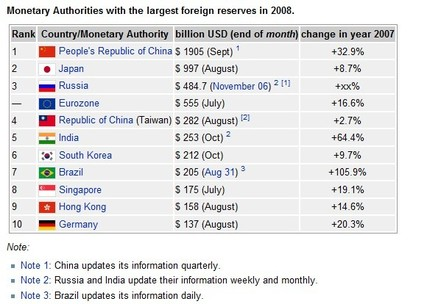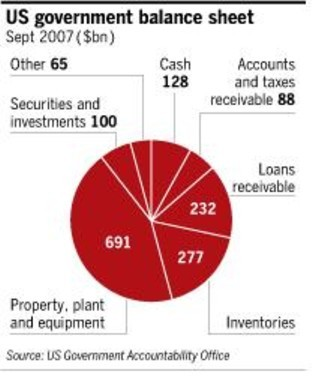Breakdown of the Global Monetary System by summer 2009
The G20-meeting held in Washington on November 14/15, 2008, is in its essence a historical indicator that the Western – above all Anglo-Saxon – monopoly on global economic and financial governance, is coming to an end. Nevertheless, according to LEAP/E2020, this meeting also clearly demonstrated that this kind of summits is doomed to inefficiency because they concentrate on curing the symptoms (banks’ and hedge funds’ financial difficulties, derivative markets’ explosion, financial and currency markets’ dramatic volatility, …) rather than the fundamental root of the current crisis, i.e. the collapse of the Bretton Woods system based on the US Dollar as sole pillar of the global monetary system. Without a complete overhaul of the system inherited from 1944 by summer 2009, the failing of the current system and that of the United States at the center, will lead the whole planet to an unprecedented economic, social, political and strategic instability, and more specifically to a breakdown of the global monetary system by summer 2009. In light of the technocratic jargon and calendar of the declaration released after this first G20-meeting (totally disconnected from the speed and scope of the unfolding crisis (1)), it is more than likely that the disaster will have to happen for the fundamental problems to be seriously addressed and for the beginning of a reply to be initiated.
Four key-factors are now pushing the Bretton Woods II (2) system to collapse in the course of the year 2009:
• Fast weakening of the central players: USA, UK
• Three visions of the future of global governance will be dividing world’s largest players (United-States, Eurozone, China, Japan, Russia, Brazil) by spring 2009
• Unbridled speeding-up of the last decade’s (de-)stabilizing processes
• Increasing number of more and more violent backlashes.
LEAP/E2020 already extensively described factors 1 and 4 in previous editions of the GEAB. Therefore we will concentrate on factors 2 and 3 in the present edition (GEAB N°29).
The agitation that has seized global leaders since the end of September 2008 indicates that panic has struck at the highest level. Worldwide political leaders have now understood that the house is on fire. But they have not yet perceived something obvious: that the very structure of the building is involved. Improving fire-regulations or reorganizing emergency services will not be sufficient. To use a strong symbolic image, the World Trade Center’s twin towers did not collapse because firemen were late or because water was missing in the automatic fire-system, they collapsed because their structure was not meant to support the shock of two airliners hitting them in just a few minutes.
Today’s global monetary system is in a similar situation: the twin-towers are the Bretton Woods system, and the airliners are called « subprime crisis », « banking failures », « economic recession », « Very Great US Depression », « US deficits », … a whole squadron.

Today’s leaders, who all belong to the collapsing world (including Barak Obama (3)), cannot possibly imagine how to solve the problem, just like central bankers in 2006/2007 could not possibly imagine the scope the unfolding crisis could reach (4). It is their world which is disappearing under their eyes, their beliefs and their illusions (sometimes similar) (5). According to our team, a 20 percent renewal of worldwide leaders is required to begin to see sustainable solutions (6) appear. This is indeed, according to LEAP/E2020, the « critical mass » needed to permit any fundamental change of perspective in a complex not very hierarchical human group. Today we are still far from reaching this critical mass: in order to contribute to finding solutions to the crisis, those new leaders must accede power in full awareness of the crisis’ specific nature.
According to LEAP/E2020, if global leaders fail to realize that in the next three months and to take actions in the next six months, as explained in GEAB N°28, the US debt will « implode » by summer 2009 under the shape of the country’s defaulting or the Dollar’s dramatic devaluation. This implosion will follow closely a number of similar episodes affecting less central countries (see GEAB N°28), including the United Kingdom whose already huge debt is ballooning at the same pace as Washington’s (7). In the same way as the US Federal Reserve saw, month after month, its « Primary Dealers » (8) being swept away by the crisis before it was itself confronted to a real problem of capitalization and therefore survival, the United States in the coming year will witness the implosion of all countries too-closely integrated to their economy and finance, and of their allies financially too-dependent on them (9).

The role the Europeans can play in the matter is essential (10). The Eurozone in particular must send out a strong message towards Washington: « The United States will fall into an economic and financial pitfall in 2009 if they cling to their past « privileges ». Once the world has given up on the Dollar, it will be too late to negotiate ». With more than 550-billion USD, the Eurozone owns the third largest reserve (ex-aequo with Russia who is not very accurate on that aspect) after China and Japan, and before the Gulf oil-monarchies (see table above). It therefore has the diplomatic weight, the financial weight, the economic weight, the commercial weight and the monetary weight required to compel Washington to face realities (11). The EU altogether will follow because non-Euro EU countries are all on the verge of a severe crisis of their currency or economy or both (12). Without the Euroland, their outlook is very gloomy in the short and medium term. As a matter of fact, the Euro is the only currency a growing number of initially reluctant (Iceland, Denmark…) or skeptical (Poland, Czech Republic, Hungary…) countries now wish to join (13).
Sign of the times, the Financial Times has started to list the US federal state’s tangible assets: military bases, national parks, public buildings, museums, etc… everything has been evaluated for a total amount of approximately 1,500-billion USD, i.e. more or less the probable amount of the budget deficit in 2009 (see the detail of these assets in the chart below). No wonder why Taiwan, despite its dependence on the security provided by Washington, decided to stop buying one of the three great components of the US public deficit, the Fannie Mae and Freddy Mac securities (despite the fact that they were « rescued » by the government (14)); or why Japan is now a net-seller of US T-Bonds.
All those who, despite our advice in the past two years, invested in Fannie and Freddy securities or in stock markets or in large US private equity banks or in the banking sector in general, have no reason to worry: it will not happen because « they » will prevent it! A problem remains however: “they” are now panic stricken and “they” understand nothing to this situation “they” were never prepared to face. Like we explained in the GEAB N°28, 2008 was only the detonator of the global systemic crisis. Now comes Phase IV, phase of the aftermath!

Notes:
(1) Here is the final communique released and a first non-committal analysis from the French press (Journal du Dimanche, close to the Paris government) which gives an idea of the opinion of the media throughout the Eurozone. Obviously the G20-Summit did not manage to calm down the crisis, it could even result in enhanced worry, seen the US refusal to agree on addressing the real problems.
(2) Whatever may think Gordon Brown and Nicolas Sarkozy, as well as some rather unprofessional media, Bretton Woods II dates back to the 1970s. In 1971 indeed, the US unilateral decision to give up the Dollar/Gold peg, soon followed by the Jamaica agreement in 1976, put an end to the initial Bretton Woods framework and marked the beginning of a system of floating exchange rates (Bretton Woods II).
(3) The future president of the United States seems to have for sole aim the implementation of his campaign program (social security, infrastructure, middle-class tax reduction,…), listed before the crisis, and requiring major expenses, when the US federal state is already over-indebted. It was a perfect program… for an America that no longer exists except in electoral speeches.
(4) On this subject, read our anticipations in GEAB N°17 and N°18.
(5) This goes for the USD-reserves of many countries such as China, Japan and the Gulf oil-monarchies. Today’s leaders are not able to imagine that the hundreds of billions of USD piled up in their reserves are only worth 50 or 30 percent of their face value. It will belong to their successors to make rational conclusions and invent a different global system.
(6) That is to say conceptually relevant and efficiently implemented.
(7) As a matter of fact, because of its strong recession, the United Kingdom is already accounting for a large part of the EU’s slowdown in 2009. Great-Britain will be the « sickman » of the EU in the years to come.
(8) It is informative to read on Wikipedia the history of « Primary Dealers », those banks chosen by the US Federal Reserve as privileged partners and sole ones allowed to deal with the Fed. Indeed after a few decade-long period of stability, the list has suddenly begun to shrink as « primary dealers » began to be swept away by the crisis in 2008.
(9) Talking about dependent allies, Pakistan and Ukraine are already under IMF perfusion, and Turkey’s credit rating is about to be downgraded. Egypt, Israel and Colombia should soon join the list.
(10) Joseph Stiglitz also underlines this point in his article dated 11/11/2008 in the Telegraph
(11) Our team is far from believing that the Eurozone is not confronted to severe difficulties as well (on the economic outlook, see GEAB N°28 in particular), but in a historic crisis such as the one currently unfolding, these problems are minor compared to those the US, the UK or even Asia will face in the next year.
(12) For instance Latvia has just nationalized as a matter of urgency the country’s second largest bank, Hungary is under ECB and IMF perfusion, Polish growth is collapsing, Denmark and Sweden will join the Eurozone in the couple of years, UK is in distress…
(13) Source: NRC, 11/13/2008. Unlike the US, currency faced to a general move on the part of countries willing to « un-peg » from the Dollar, or even create alternative currencies such as the Gulf’s oil-monarchies and their project of common currency by 2010. Source: GulfNews, 09/22/2008
(14) Fanny Mae’s announcement of a new record-high loss in the third quarter (29-billion USD) might provide an explanation. Sources : Barron’s, 10/24/2008; MarketWatch, 11/10/2008

